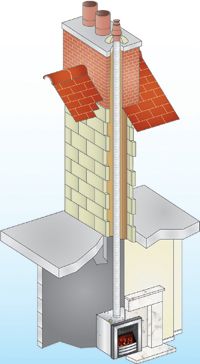With a significant volume of social housing stock still to reach Decent Homes standard, Simon Osborne, specification channel manager at Baxi, explains how the next generation of high efficiency back boilers offers a solution for some hard-to-treat properties.
By 2010 it was expected that 92 per cent of all social housing would be upgraded to a decent standard. Instead, for some landlords with a significant volume of social housing stock still requiring an upgrade, deadlines have been extended.

Looking good, the Baxi Bermuda
Not only is it important to ensure homes are decent for their tenants, energy efficient heating is also key to reducing the UK's carbon emissions and meeting carbon targets.
The previous government set itself a challenging target to reduce carbon emissions by 80 per cent by the year 2050. The new prime minister, David Cameron, was recently quoted as saying he wanted the current government to be the 'greenest ever', so he appears keen to take up this batten.
Since UK homes account for 30 per cent of the country's carbon emissions, efforts made to improve energy efficiency in existing housing stock will have a dramatic impact on reaching this target.
According to the recently published English House Conditions Survey, some 8.6 million (39 per cent) of homes were built before 1945, including around 4.5 million built before 1919. Around a third of non-decent homes are classed as hard to treat.
Naturally, the energy performance and condition of older homes is often poor and many require heating and ventilation installations to improve their thermal comfort and air quality to meet the Decent Homes standard. These homes offer the potential for significant carbon savings after refurbishment.

The entire system can be replaced in a single day
The Decent Homes standard defines a decent home as one that is warm, weatherproof and has reasonably-modern facilities and services. Efficient heating has played a key role in helping the social housing sector comply with the Decent Homes standard up until this year and beyond. However, in recent years there has been a major missed opportunity when it comes to one particular heating technology, the back boiler.
The Baxi Bermuda back boiler unit (BBU) originally launched in 1966, cleverly fitted into an existing fireplace. Today, millions of homes, many in the social housing sector, still rely on this product, and others like it, for heating and hot water.
However, when Part L of the Building Regulations changed in 2006, requiring the use of condensing boilers for replacements and new installations, the task of replacing BBUs cost-effectively became a complicated one.
At the time of the change to the Building Regulations, no condensing replacement for the BBU existed, so Part L offered exemptions for homes where condensing installations were impossible, and, in these cases, standard efficiency boilers could be installed.
But this was not a preferable option, since a like-for-like BBU replacement offered no discernible carbon saving and little energy saving for the householder. In order to install a higher efficiency boiler, space needed to be found to re-site the boiler. Pipes needed to be re-routed, tenants faced greater than anticipated disruption to their everyday lives, and the time and cost of installation and redecoration escalated.
Baxi estimates there are around 1.8 million homes still using standard efficiency BBUs. Many of these back boiler installations remain in the social housing sector.
This presented a missed chance for carbon cutting, and a great opportunity for a new generation BBU technology.
The Baxi Bermuda BBU HE solves problems for public sector specifiers, by providing the first and only high efficiency direct replacement. At more than 90 per cent efficient and with a Class 5 NOx rating (the best), householders can benefit from substantial savings on energy bills while councils can deliver on their carbon cutting obligations.
The Baxi Bermuda BBU HE can also be used in conjunction with other low and zero carbon technologies. For example, as part of a solar-ready refurbishment, the existing hot water storage cylinder can be replaced with a Megaflo Solar unvented cylinder. Solar panels can then be installed at a later date which helps make the system future proof as well as offering the potential for even lower energy bills and more carbon savings.
The appliance is quick and simple to install. Existing pipework can be used, which means the entire system can be replaced in a single day. The boiler takes combustion air from outside and vents waste gas up the fully sealed, one piece flexible concentric flue liner. A built-in condensate pump offers versatile drain options up to 10 m from the boiler.
Great progress has been made in delivering the Decent Homes programme in the UK. Now, with a high efficiency BBU option, a loophole in Part L has been successfully closed, which can help specifiers fully meet their Decent Homes obligations.
The Baxi Bermuda BBU HE can also assist the public sector in continuing to provide high standards of housing into the future, dramatically cutting the time and cost of boiler refurbishment, lowering residents' fuel bills and significantly reducing carbon emissions as well.